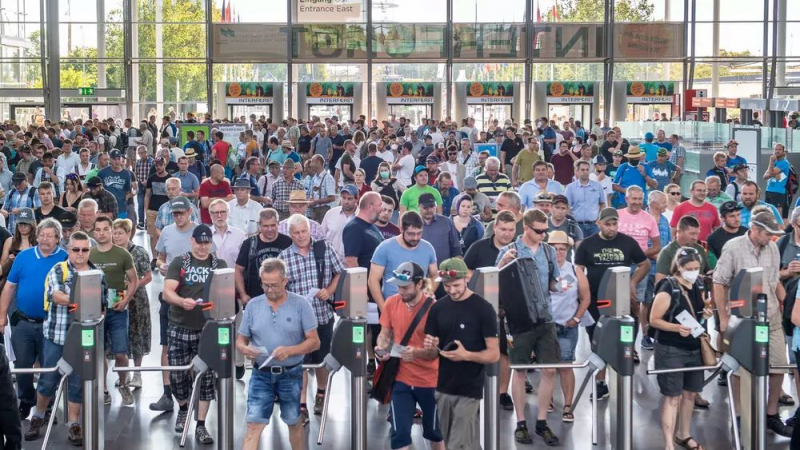Ponsse's Interim Report for 1 January - 31 March 2025
January-March:
– Net sales amounted to EUR 185.4 (169.7) million
– Operating profit totalled EUR 13.2 (1.2) million, equalling 7.1 (0.7) per cent of net sales
– Net result was EUR 14.4 (-3.4) million
– Earnings per share were EUR 0.51 (-0.12)
– Order books stood at EUR 187.7 (226.0) million at the end of the period under review
– Cash flow from business operations was EUR 15.9 (8.5) million
– Equity ratio was 60.7 (57.6) per cent at the end of the period under review
– The company’s euro-denominated operating profit is estimated to be slightly higher in 2025 than in 2024 (EUR 36.8 million)
PRESIDENT AND CEO JUHO NUMMELA:

The forest machine market picked up slightly during the first quarter of the year. Order intake totalled EUR 184.5 million. At the end of the period, the company’s order books stood at EUR 187.7 (226.0) million. The order books turned to a slight increase at the end of the quarter, driven by the European market.
Despite the challenging financial and labour market situation, our net sales increased positively by about nine per cent to EUR 185.4 (169.7) million. Ponsse’s machine deliveries increased from the previous year and the factory operated as planned. Net sales of maintenance services remained at a high level, driven by the busy start of the year for our customers. The slight recovery of the used machine market reflected the workloads of our customers, and used machine sales showed growth during the review period. While the operations of Epec Oy, Ponsse’s technology company, continued to suffer from the general downturn in machine manufacturing, its net sales stopped falling and settled at the previous year’s level.
Our operating profit was reasonable during the first quarter, and our relative profitability was 7.1 (0.7) per cent. The increased invoicing for new machines and the improved situation involving the Full Service agreement of Ponsse Latin America Ltda, Ponsse’s subsidiary in Brazil, had an impact on the development of the operating profit. Customer cooperation under the agreement has been stabilized.
Cash flow during the period under review was EUR 15.9 (8.5) million. Stock levels have remained stable after the beginning of the year, and the cash flow has been facilitated especially by the good operating result and the increase in trade payables following higher purchase volumes. Used machine stocks remain high, raising our working capital above normal. The company’s solvency has remained at a very good level. Ponsse is net debt-free, and its own capital ratio has developed favourably.
Ponsse is closely monitoring the changed global situation. The tariff policy causes challenges and uncertainties in the markets. At Ponsse, we are staying calm and are monitoring how the global tariff policy will affect the global economy. We focus on serving our customers as well as possible in all situations.
Ponsse is currently celebrating its 55-year history with a festive tour, which started in Finland earlier this year. In six locations we were able to meet customers and partners, forestry professionals and forest owners. The meetings allowed us to look back on the company's history and the development of forest machines from the 1970’s to the present day, but always with an eye to the future: how we can continue to make the best forest machines in the world, listening to our customers' wishes and feedback. Our celebration tour continues this year in more than ten countries around the world.
NET SALES
Consolidated net sales for the period under review amounted to EUR 185.4 (169.7) million, which is 9.3 per cent more than in the comparison period. International business operations accounted for 75.2 (71.2) per cent of net sales.
Net sales were regionally distributed as follows: Nordic countries and the Baltics 46.7 (50.4) per cent, Central and Southern Europe 22.8 (19.7) per cent, North America 13.1 (9.8) per cent, South America 15.8 (18.0) per cent and Asia, Australia and Africa 1.6 (2.1) per cent.
PROFIT PERFORMANCE
The operating profit amounted to EUR 13.2 (1.2) million. The operating profit equalled 7.1 (0.7) per cent of net sales for the period under review. The impact on profit of the Brazilian Full Service contract for the period under review was EUR -1.0 million. There is a provision of EUR 15.0 million in the Group's balance sheet for a loss-making contract. Provision was increased by a net amount of EUR 1.0 million during the period under review. The contract is fixed-term and will expire at the end of 2026.
Consolidated return on capital employed (ROCE) stood at 15.7 (-0.8) per cent.
Staff costs for the period under review totalled EUR 29.7 (27.8) million. Other operating expenses stood at EUR 21.8 (22.1) million. The cost impact of the loss-making Full Service contract of the Brazilian subsidiary is included in other operating expenses. The net total of financial income and expenses amounted to EUR 1.8 (-3.8) million. Exchange rate gains and losses due to currency rate fluctuations were recognised under financial items, having a net impact of EUR 2.2 (-2.7) million. During the period under review, EUR -0.1 million of revaluation losses on interest rate swaps were recognised in the result. The parent company’s receivables from subsidiaries stood at EUR 104.9 (119.2) million net. Receivables from subsidiaries mainly consist of trade receivables.
Result for the period under review totalled EUR 14.4 (-3.4) million. Diluted and undiluted earnings per share (EPS) came to EUR 0.51 (-0.12).
STATEMENT OF FINANCIAL POSITION AND FINANCING ACTIVITIES
At the end of the period under review, the total consolidated statements of financial position amounted to EUR 561.2 (557.2) million. Inventories stood at EUR 222.8 (234.8) million. Trade receivables totalled EUR 51.4 (53.3) million, while cash and cash equivalents stood at EUR 78.0 (55.2) million. The EUR 3 million receivable related to sale of all Ponsse’s shares in its Russian subsidiary, OOO Ponsse matured in March 2025 and is still included in current receivables. Group shareholders’ equity stood at EUR 338.4 (319.5) million and parent company shareholders’ equity (FAS) at EUR 304.6 (290.6) million. The amount of interest-bearing liabilities was EUR 71.2 (100.5) million. The company has ensured its liquidity by credit facility limits and commercial paper programs. Group's loans from financial institutions are non-collateral bank loans without financial covenants. Consolidated net liabilities totalled EUR -6.7 (45.4) million, and the debt-equity ratio (net gearing) was -2.0 (14.2) per cent. The equity ratio stood at 60.7 (57.6) per cent at the end of the period under review.
Cash flow from operating activities amounted to EUR 15.9 (8.5) million. Cash flow from investment activities came to EUR -4.9 (-5.9) million.
ORDER INTAKE AND ORDER BOOKS
Order intake for the period under review totalled EUR 184.5 (163.5) million, while period-end order books were valued at EUR 187.7 (226.0) million.
DISTRIBUTION NETWORK
With focus on sales and maintenance, the organisation is divided into five market areas: 1) Nordic countries and the Baltics; 2) Central and Southern Europe; 3) South America; 4) North America; and 5) Asia, Australia and Africa.
R&D AND CAPITAL EXPENDITURE
Group’s R&D expenses during the period under review totalled EUR 5.9 (5.7) million, of which EUR 1.7 (2.2) million was capitalised.
Investments during the period under review totalled EUR 4.9 (6.0) million. In addition to capitalised R&D expenses, they consisted of investments in buildings and ordinary investments in machinery and equipment.
PERSONNEL
The Group had an average staff of 2,035 (2,116) during the period under review and employed 2,035 (2,114) people at the end of the period.
SHARE-BASED INCENTIVE PLANS
The Board of Directors of Ponsse Plc approved two new Ponsse Group’s share-based incentive plans for the Group’s CEO and key employees in 2023. A stock exchange release regarding the incentive plans was published on 3 March 2023. The aim of the new plans is to align the objectives of the shareholders and plan participants for increasing the value of the company in the long-term, to retain the participants at the company and to offer them competitive reward schemes that are based on earning and accumulating the company’s shares. The Board of Directors of Ponsse Plc decided on new performance periods of share-based incentive plans in June 2024 and published a stock exchange release about them on 11 June 2024.
The CEO Performance-Based Share Ownership Plan
The CEO plan consists of five performance periods, calendar years 2023, 2023-2024, 2023-2025, 2024-2026 and 2025-2027. A restriction period is included in performance periods 2023 and 2023-2024, which begins from the reward payment and ends on 31 December 2025. The matching reward will be paid by the end of May 2024, 2025 and 2026. The matching shares delivered as a matching reward cannot be transferred during a restriction period that will end on 31 December 2025, 31 December 2026 and 31 December 2027. The performance-based reward will be paid by the end of May after the end of each performance period. The shares received as reward based on performance periods 2023 and 2023-2024 cannot be transferred during the restriction period, i.e. 31 December 2025.
In May 2024, a total of 11,457 shares worth EUR 282,226 were paid for the 2023 performance period, with a cost impact of EUR 0.4 million for the company. A stock exchange release concerning these was issued on 30 May 2024. From the 2023–2024 and 2023–2025 performance periods, it is possible to earn a total of 42,612 shares, including the cash portion (gross reward). The conditional rewards for the 2023–2024 performance period will be paid by the end of May 2025.
During the performance period 2024-2026 of the CEO Performance-Based Share Ownership Plan, the rewards are based on the group’s operating result, revenue, personnel satisfaction and injury frequency (LTIF). The amount of rewards to be paid based on the performance period 2024-2026 will correspond to an approximate maximum total of 50,000 Ponsse Plc shares, including also the portion to be paid in cash (gross reward). The matching shares delivered as a matching reward cannot be transferred during a restriction period that will end on 31 December 2026. The performance-based reward will be paid by the end of May 2027.
The payment of rewards under both the conditional and performance-based shareholding plans requires that the person’s employment relationship continues.
Key Employee Performance-Based Matching Share Plan
The key employees’ plan consists of three performance periods, each lasting for three calendar years: 2023–2025, 2024–2026 and 2025–2027. The prerequisite for participating in the performance period and receiving the reward is that the key employee participating in the plan acquires shares in the company at the beginning of the performance period. Ponsse delivers matching shares for the performance period in a 2:1 ratio: the key employee receives one (1) additional share for every two (2) shares they have acquired. The conditional reward will be paid in 2023, 2024 and 2025 after the acquisition of the investment shares and confirmation of the reward, as soon as practically possible. Shares received as conditional rewards may not be transferred during the restriction periods ending on 31 December 2025, 31 December 2026 and 31 December 2027. The performance-based reward will be paid by the end of May following the end of each performance period. The portion of the maximum reward to be paid to a participant is determined based on the achievement of the targets set for the earning criteria in relation to the investment made by the participant. The target group includes key employees, including the members of the Group Management Team, with the exception of the CEO.
The rewards for the 2023–2025 performance period of the key employees’ matching share plan are based on the Group’s operating result, net sales and employee satisfaction. The accident frequency rate has been added to the terms of the 2024–2026 performance period. The rewards to be paid for the 2024–2026 performance period are estimated to correspond to no more than 60,000 Ponsse Plc shares (net reward). In addition, the company will pay the taxes and statutory social security contributions incurred by the participants in connection with the payment of the rewards. During the period under review, the costs related to the 2023-2025 and 2024-2026 performance periods of the share based incentive plans amounted to a total of EUR 0.4 million.
For the performance periods that started in 2023 and 2024, the total cost impact of the share-based incentive plans for the CEO and key employees is estimated to be around EUR 2.3 million for 2023–2026.
SHARE PERFORMANCE
The company’s registered share capital consists of 28,000,000 shares. The trading volume of Ponsse Plc shares for 1 January – 31 March 2025 totalled 283,609, accounting for 1.01 per cent of the total number of shares. Share turnover amounted to EUR 6.7 million, with the period’s lowest and highest share prices amounting to EUR 19.55 and EUR 28.20, respectively.
At the end of the period, shares closed at EUR 26.90, and market capitalisation totalled EUR 753.2 million.
At the end of the period under review, the company held 20,710 treasury shares.
ANNUAL GENERAL MEETING
Ponsse Plc's Annual General Meeting was held on Tuesday 8 April 2025. A separate release was issued on Tuesday 8 April 2025 regarding the resolutions at the AGM. The Annual General Meeting approved the consolidated financial statements and the company’s financial statements for the financial year 1 January – 31 December 2024 and discharged the members of the Board of Directors and CEO from liability. The Annual General Meeting decided that a dividend of EUR 0.50 per share will be paid for the financial year of 1 January – 31 December 2024. The Annual General Meeting decided that a maximum of EUR 100 profit bonus per person per working month is to be paid for the financial year 2024 to the personnel employed by the group. The Annual General Meeting approved the remuneration report for the company’s governing bodies for financial year 2024.
The Annual General Meeting confirmed that the Board of Directors consists of seven (7) members. The Annual General Meeting re-elected Jarmo Vidgren, Mammu Kaario, Terhi Koipijärvi, Matti Kylävainio, Ilpo Marjamaa and Juha Vanhainen, and elected Juha Vidgren as new member for the term starting at the end of the Annual General Meeting on 8 April 2025 and ending at the end of the Annual General Meeting following the election. In its constitutive meeting convening right after the Annual General Meeting, the Board of Directors decided to elect Jarmo Vidgren as Chairperson of the Board of Directors and Mammu Kaario as the Deputy Chairperson of the Board of Directors. The Annual General Meeting resolved on an annual compensation of EUR 48,000 for the Chairperson of the Board of Directors, EUR 45,000 for the Deputy Chairperson of the Board of Directors, and EUR 38,000 for the ordinary members of the Board of Directors. Travel expenses will be reimbursed in accordance with the company’s travel policy.
The Annual General Meeting resolved to re-elect the authorized Public Accountant KPMG Oy Ab as the company's auditor as well as the sustainability reporting assurance provider. KPMG Oy Ab has announced that Ari Eskelinen, Authorized Public Accountant, will continue to act as the principal auditor, and APA, authorized sustainability auditor (ASA) Anna-Riikka Maunula will act as the principal authorized sustainability auditor. The remuneration to the auditor and the sustainability reporting assurance provider will be paid according to the reasonable invoice approved by the company.
The Annual General Meeting resolved to authorize the Board of Directors to decide on the repurchase of a maximum of 250,000 company’s own shares in one or more tranches, corresponding to approximately 0.89 % of the company’s total shares and votes. The authorization is valid until the closing of the next Annual General Meeting, however, no longer than until 30 June 2026.
The Annual General Meeting resolved to authorize the Board of Directors to decide on the issuance of shares as well as the issuance of options and other special rights entitling to shares referred to in Chapter 10, Section 1 of the Finnish Companies Act. The number of shares to be issued based on the authorization may in total amount to a maximum of 250,000 shares (including shares issued based on options or special rights), corresponding to approximately 0.89 % of all the shares in the company. The authorization is valid until the closing of the next Annual General Meeting, however, no longer than until 30 June 2026.
SUSTAINABILITY
We have defined our key sustainability targets that we seek to achieve through annual function-specific targets and measures as part of the company’s strategy process. We want to improve our people’s wellbeing; innovate sustainable solutions that respect nature; develop our operations without burdening nature; and be a reliable partner that values community.
During the first quarter, Ponsse published its first sustainability report in accordance with the Finnish Accounting Act and the European Sustainability Reporting Standards (ESRS) as part of the Board of Directors’ report. Ponsse’s sustainability report complies with the requirements of the EU Corporate Sustainability Reporting Directive (CSRD) and has been certified in accordance with the ISAE 3000 assurance engagement standard. KPMG Oy Ab acted as the sustainability audit firm during the 2024 financial period.
At the beginning of the year, Ponsse updated the ESG (Environmental, Social & Governance) criteria linked to its financial agreements, which are compatible with the company’s sustainability targets. The ESG criteria for sustainability-linked loans measure the company’s performance using metrics within the scope of sustainability assurance, which are 1) direct Scope 1 greenhouse gas emissions and Scope 2 emissions from the production of purchased energy; 2) the waste recycling rate; and 3) the lost-time injury frequency (LTIF).
Ponsse published its new Code of Conduct and related online training at the beginning of the year. The goal is that every Ponsse employee commits to complying with the Code of Conduct and completing related training by the end of 2025. At the same time, the company updated and communicated the guidelines for its whistleblowing channel. Ponsse has had the whistleblowing channel required by the EU Whistleblower Directive since 2020. The channel provides the company’s personnel and stakeholders with the opportunity to report actual or suspected violations of the Code of Conduct, including anonymously.
In the development of safety, Ponsse started to monitor accidents involving external employees and provide the personnel with Ponsse Pillars of Safety training.
In terms of products, Ponsse released the new PONSSE Greasing System, which not only improves usability but also aims to minimise the adverse environmental impact caused by saw chain lubrication. The system applies grease onto the saw chain of the harvester head based on the forest machine’s information system settings. Vaseline dosed from recycled grease cartridges does not spread in forests through oil mist and does not stain machine windows, thereby reducing the use of cleaning solvents. The consumption of vaseline is less than half that of saw chain oil, and it is also available as a biodegradable product.
RISK MANAGEMENT
Our risk management is based on the company’s values and strategic and financial goals. The purpose of risk management is to support the company’s strategic objectives and to secure its financial development and the continuity of its business. Ponsse’s management conducts an annual risk assessment that includes the sustainability risks and opportunities impacting the company’s business. Within them, aspects related to climate change, biodiversity, and resource efficiency together with digitalisation and technological development are emphasised.
The purpose of risk management is to identify, assess, and monitor business-related risks that may impact the realisation of the company’s strategic and financial objectives or the continuity of business. This information is used to decide what measures will be required to prevent risks and respond to current risks.
Risk management is part of the company’s daily business and has been incorporated into its management system. Risk management is directed by the risk management policy approved by the Board of Directors.
A risk is any event that may prevent the company from achieving its objectives or threatens the continuity of business. A risk may also be a positive event, in which case the risk is treated as an opportunity. Each risk is assessed on the basis of its impact and probability. The company’s risk management methods include the avoidance, mitigation, and transfer of risk. Risks may also be managed by controlling and minimising their impacts.
SHORT-TERM RISK MANAGEMENT
The most significant short-term risks are related to the global geopolitical situation, relatively weak economic development and uncertainty about the development of the interest rates on financing. The geopolitical situation is also reflected in trade policy through possible special tariffs and protectionism. Financial market disruptions, sanctions and growing cybersecurity threats are adding to the uncertainty. The risks in the financial market may increase fluctuations in developing countries’ foreign exchange markets, and continued instability of the global economy and growing financial costs may also reduce the demand for forest machines.
In this challenging situation, Ponsse’s strong financial position is important. In terms of financing, Ponsse has carried out all measures necessary to ensure business continuity, and its financing situation is regularly assessed. The key objective of the company’s financial risk management is to ensure liquidity and manage interest rate and currency risks. The company’s financial position and liquidity have remained strong as a result of binding credit limit facilities agreed with several financial institutions. The impact of interest rate risks is reduced by means of credit linked to different reference rates, as well as interest rate swaps. The risk of currency rate fluctuations is partly mitigated through derivative contracts.
The parent company monitors the changes in the Group’s internal and external trade receivables and the associated risk of impairment. The company has long-term and extensive service contracts, which may involve operational risks.
Changes taking place in the fiscal and customs legislation in countries to which Ponsse exports may hamper the company’s export trade or reduce its profitability. Global supply chain disruptions can make it more difficult to manage PONSSE forest machine production schedules, in addition to tying up more capital in the company’s supply chain and increasing the risks related to working capital management.
Ponsse has strengthened cybersecurity by further specifying its software update policy and user manuals. The ability to detect and respond to abnormal activity in data networks has been improved, and the company’s digital services are regularly tested for cyberattacks in cooperation with an expert partner. The implementation of the NIS2 Directive on cybersecurity is proceeding on schedule.
OUTLOOK FOR THE FUTURE
The company’s euro-denominated operating profit is estimated to be slightly higher in 2025 than in 2024 (EUR 36.8 million).
Economic uncertainty is expected to continue and affect demand for forest machinery. The current operating environment is reflected by trade policy, the geopolitical situation and economic uncertainty in the countries where we operate.
We will focus on strong customer service and improve our efficiency by introducing consistent and cost-effective practices in line with our new operating model. Our investments will continue, with a deliberate focus on new products and digital services, the service network, the Vieremä factory and sustainability.
The status of the Full Service contract of Ponsse's Brazilian country-organisation is under close scrutiny and the company continues to take measures to improve the situation.
EVENTS AFTER THE PERIOD
There are no other known events after the end of the reporting period that would require either adjustments to the information presented for the period under review or disclosure of additional information.













